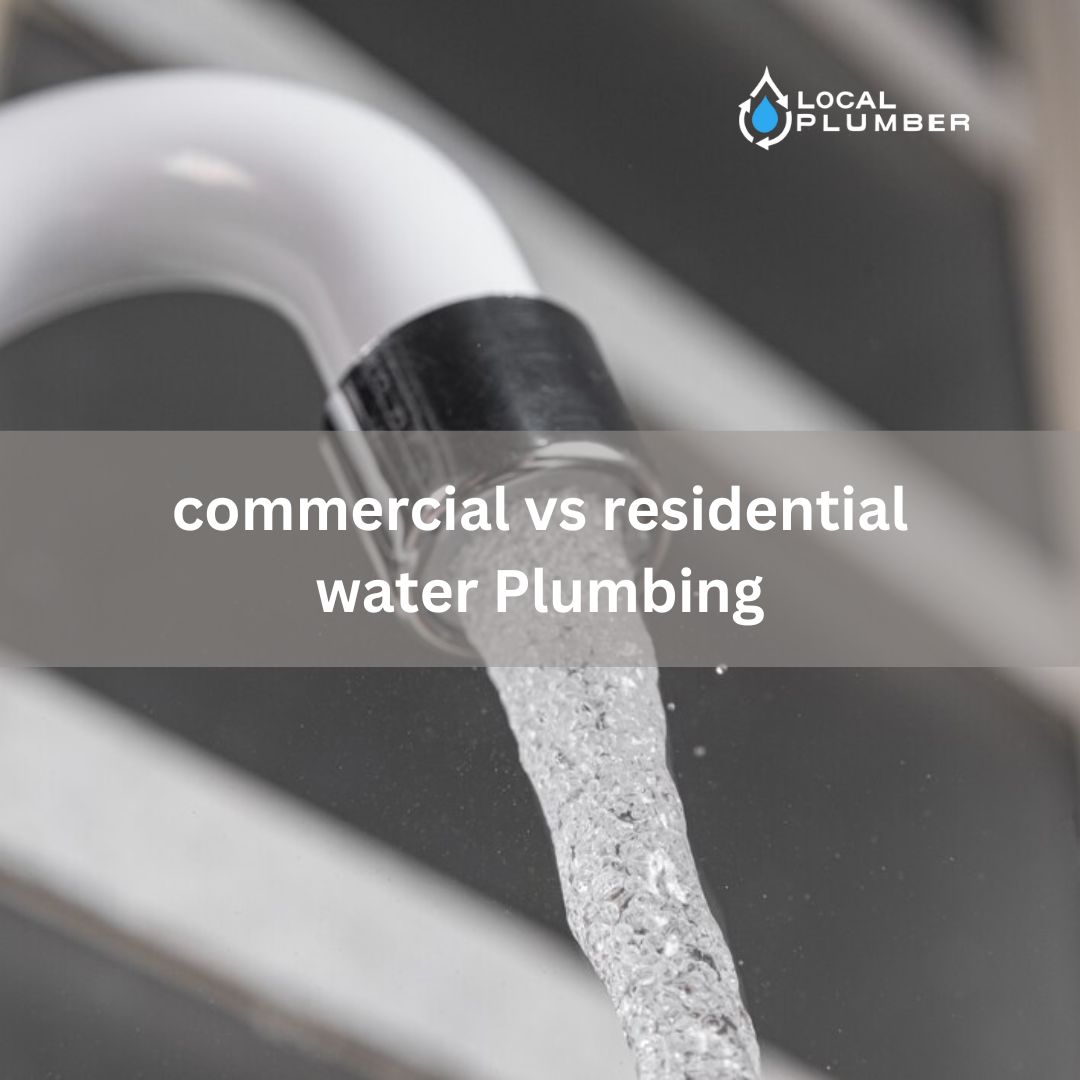
Difference between commercial and residential water
Water is an essential resource, and the systems that deliver and manage it in residential and commercial settings play a critical role in our daily lives. However, these two categories of water systems can differ significantly, from scale and complexity to regulations and usage patterns. In this comprehensive guide, we will delve into the differences between commercial and residential water systems, addressing various aspects such as water demand, infrastructure, regulatory requirements, and common plumbing issues that property owners and our experts at Local Plumber often encounter.Establishing the Basics: Residential vs. Commercial Water Systems
Before we dive into the details, it’s essential to have a foundational understanding of what residential and commercial water systems entail.
Residential Water Systems:
Residential water systems refer to single-family homes, apartments, condominiums, and similar dwellings. These systems are designed to serve a limited number of individuals and cater to the daily water needs of a household.
Commercial Water Systems:
Commercial water systems encompass larger, more complex setups that are tailored to meet the water demands of businesses, institutions, and organizations. These systems serve multiple users and often require high-volume water distribution to meet the specific needs of the commercial establishment.
Water Consumption
One of the most noticeable disparities between commercial and residential water systems is the amount of water consumed. Commercial properties, generally, require a much larger volume of water compared to residential properties. This heightened demand can be attributed to several factors, including the size of the property, the number of occupants or visitors, and the nature of the business.
Factors Contributing to Increased Water Consumption in Commercial Properties:
- Larger Physical Footprint: Commercial properties, such as office buildings, hotels, and manufacturing facilities, are typically much larger than residential homes. Consequently, longer pipes and increased water flow are necessary to cover the entire area.
- Higher Occupancy: Commercial establishments often have a significant number of employees, customers, or guests. For example, restaurants require more water for cooking, cleaning, and restroom facilities to accommodate the influx of customers.
- Specialized Equipment: Many commercial operations rely on specialized equipment that consumes substantial quantities of water. Industrial processes, for instance, frequently involve water-intensive machinery.
- 24/7 Operations: Unlike most residences, many commercial establishments operate around the clock, further increasing water consumption.
- Landscape Irrigation: Commercial properties often have extensive landscapes that require irrigation, contributing to higher water usage.
Residential Water Consumption:
Residential water consumption is more predictable and consistent. While daily usage may fluctuate, it is typically within a manageable range. Common residential water uses include bathing, washing, cooking, and irrigation (if applicable). The infrastructure is designed to handle the requirements of a family or a few individuals.
Water Distribution Infrastructure
The distribution of water in residential and commercial settings also varies significantly in terms of complexity and scale.
Residential Water Distribution:
Residential water distribution systems are relatively straightforward. Water is typically supplied from a public utility or a private well. It flows through a single meter and enters the property, where it is then distributed to various fixtures and appliances within the home. Water pressure and flow are maintained at levels suitable for household use.
Commercial Water Distribution:
Commercial water distribution systems are more intricate due to the increased complexity of the property. They often involve multiple meters and larger pipes to accommodate the higher demand. Water is distributed to a range of fixtures, including restrooms, kitchens, manufacturing areas, and possibly outdoor spaces. Maintaining adequate water pressure and flow rates throughout the property is essential to meet the needs of employees and customers.
Regulatory Requirements
Both residential and commercial water systems are subject to regulations and building codes, but these requirements can differ significantly.
Residential Water Regulations:
Residential water systems are typically governed by local building codes and plumbing regulations. These codes ensure that water supply and plumbing systems in homes meet safety and quality standards. While there are variations from one jurisdiction to another, the focus is generally on providing potable water and safe wastewater disposal.
Commercial Water Regulations:
Commercial water systems face a more extensive regulatory framework. In addition to local building codes, commercial properties often need to adhere to industry-specific regulations. For instance, food service establishments must meet stringent standards for water quality and waste disposal. Compliance with these regulations is crucial to ensuring the health and safety of employees and customers.
Common Plumbing Issues
The types of issues that can arise in commercial and residential water systems differ, primarily due to variations in scale and complexity.
Common Residential Plumbing Issues:
- Leaky Faucets and Toilets: These issues are common in residential settings and can result in water wastage and higher bills.
- Clogged Drains: Residential properties often encounter clogs in sinks, showers, and toilets.
- Water Heater Problems: Residential water heaters may suffer from issues like insufficient hot water, leaks, or breakdowns.
- Frozen Pipes: In cold climates, residential properties may experience frozen or burst pipes during winter.
- Low Water Pressure: Residential water systems can experience low water pressure due to sediment buildup or other factors.
Common Commercial Plumbing Issues:
- Sewer Line Blockages: Commercial properties with extensive wastewater flow can experience sewer line clogs, which can disrupt operations and require immediate attention.
- Backflow Prevention: Commercial properties are often required to have backflow prevention devices to protect against contamination of the public water supply.
- Water Quality Compliance: Compliance with water quality standards is crucial for businesses in industries like food service and healthcare.
- Fire Sprinkler Systems: Commercial properties with fire sprinkler systems must ensure that these systems are well-maintained to meet safety regulations.
- Boiler and Chiller Maintenance: Large commercial properties with boilers and chillers require regular maintenance to ensure energy efficiency and compliance with regulations.
The Role of Professional Plumbers
Whether it’s a residential or commercial water system, the role of professional plumbers is invaluable. They are responsible for installation, maintenance, repair, and compliance with regulations. Here’s how plumbers contribute in both settings:
Residential Plumbers:
Residential plumbers provide the following services:
- Installation and Repair: They install and repair fixtures, appliances, and pipes within homes.
- Routine Maintenance: They conduct maintenance tasks to prevent issues like leaks and clogs.
- Emergency Services: Residential plumbers are available for urgent issues like burst pipes or water heater malfunctions.
- Compliance: They ensure that residential plumbing systems adhere to local building codes and regulations.
Commercial Plumbers:
Commercial plumbers offer the following services:
- Complex Installation: They install intricate water systems that meet the specific needs of commercial properties.
- Regular Maintenance: They provide ongoing maintenance to ensure the consistent operation of water systems.
- Emergency Response: Commercial plumbers are equipped to respond to critical issues that can disrupt business operations.
- Regulatory Compliance: They ensure that the commercial property complies with industry-specific and general plumbing regulations.
Conclusion
Water systems in residential and commercial settings serve the fundamental purpose of supplying clean water and managing wastewater. However, they differ significantly in terms of scale, complexity, water usage, and regulatory requirements. Understanding these distinctions is essential for property owners and plumbers alike to effectively manage and maintain water systems in each setting. Our experts at Local Plumber play a crucial role in ensuring the proper functioning of both residential and commercial water systems, addressing issues, and contributing to compliance with relevant regulations.





Leave a comment